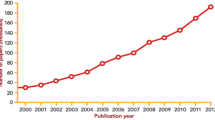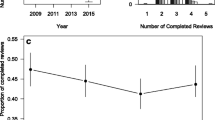Abstract
Scientific misconduct obstructs the advance of knowledge in science. Its impact in some disciplines is still poorly known, as is the frequency in which it is detected. Here, I examine how frequently editors of ecology and evolution journals detect scientist misconduct. On average, editors managed 0.114 allegations of misconduct per year. Editors considered 6 of 14 allegations (42.9%) to be true, but only in 2 cases were the authors declared guilty, the remaining being dropped for lack of proof. The annual rate of allegations that were probably warranted was 0.053, although the rate of demonstrated misconduct was 0.018, while the rate of false or erroneous allegations was 0.024. Considering that several cases of misconduct are probably not reported, these findings suggest that editors detect less than one-third of all fraudulent papers.

Similar content being viewed by others
References
Broad, W., & Wade, N. (1982). Betrayers of the truth. New York: Simon & Shuster.
Claxton, L. D. (2005). Scientific authorship Part 1. A window into scientific fraud? Mutation Research-Reviews in Mutation Research, 589, 17–30.
Fanelli, D. (2009). How many scientists fabricate and falsify research? A systematic review and meta-analysis of survey data. PLoS ONE, 4(5), e5738. doi:10.1371/journal.pone.0005738.
Gardner, W., Lidz, C. W., & Hartwig, K. C. (2005). Authors’ reports about research integrity problems in clinical trials. Contemporary Clinical Trials, 26, 244–251.
Glick, J. L. (1989). On the potential cost effectiveness of scientific audits. Accountability in Research, 1, 77–83.
Judson, H. F. (2004). The great betrayal: Fraud in science. Orlando, Florida: Harcourt.
List, J. A., Bailey, C. D., Euzent, P. J., & Martin, T. L. (2001). Academic economists behaving badly? A survey on three areas of unethical behaviour. Economic Inquiry, 39, 162–170.
Marshall, E. (2000). How prevalent is fraud? That’s a million-dollar question. Science, 290, 1662–1663.
Montgomerie, R. M., & Birkhead, T. (2005). A beginner’s guide to scientific misconduct. International Society for Behavioral Ecology Newsletter, 17, 16–24.
Steneck, N. H. (2006). Fostering integrity in research: Definitions, current knowledge, and future directions. Science and Engineering Ethics, 12, 53–74.
Tourangeau, R., & Smith, T. W. (1996). Asking sensitive questions—The impact of data collection mode, question format, and question context. Public Opinion Quarterly, 60, 275–304.
Acknowledgments
This work would not be possible without the collaboration of Antonio López Orta, Anders P. Møller, David Nesbitt, the staff of the Estación Experimental de Zonas Áridas, and two anonymous referees.
Author information
Authors and Affiliations
Corresponding author
Rights and permissions
About this article
Cite this article
Moreno-Rueda, G. How Frequently do Allegations of Scientific Misconduct Occur in Ecology and Evolution, and What Happens Afterwards?. Sci Eng Ethics 19, 93–96 (2013). https://doi.org/10.1007/s11948-011-9289-8
Received:
Accepted:
Published:
Issue Date:
DOI: https://doi.org/10.1007/s11948-011-9289-8




